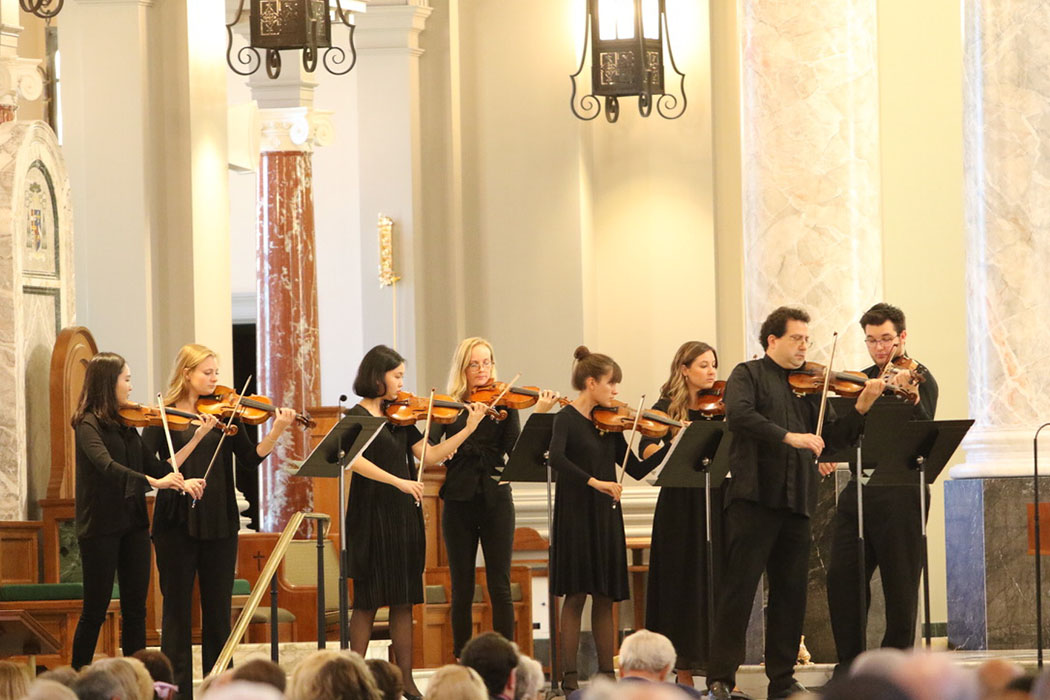Mozart: Coronation Mass & Regina Coeli
Amadeus Chamber Ensemble Orchestra & Chorus
Cathedral Concert Series — Cathedral of the Most Sacred Heart of Jesus
711 S. Northshore Drive in Knoxville
Sunday, September 25, 5:30 PM
Admission is Free, but online registration is requested
It is fair to say that Wolfgang Amadeus Mozart had a “love-hate” relationship with Salzburg, the city of his birth, childhood, and young adulthood. The prodigious musical talent of the young Mozart (and his sister Nannerl) was recognized early by both his parents and the rulers of the independent city-state 100 miles to the west of Vienna. At the time of Mozart’s birth, Salzburg was ruled by Archbishop Sigismund Christoph von Schrattenbach, who employed father Leopold Mozart as vice-Kapellmeister. For years, the Archbishop encouraged Leopold to exploit his children’s talents for the sake of Salzburg’s cultural reputation, exploitation that included sponsoring and promoting their travels throughout Europe, performing in what can only be described as a touring road-show.
When the Archbishop died in 1771, his successor was Hieronymus von Colloredo, himself a musician of some talent. Colloredo, despite his despotic leanings and frugal temperament, was an excellent judge of musical talent and continued the employment of Leopold—as well as Wolfgang as court concertmaster with a salary. However, to Colloredo, young Mozart was still a servant, serving at the pleasure of his employer with all of the limitations that implies. His nine years working for Colloredo were marked by constant arguments, requests for leaves, displays of ego, and objections to the Archbishop’s limitations and restrictions. Over this time, Mozart grew to resent not only the Archbishop, but also the provincial atmosphere of Salzburg, aspiring to bigger and better things—specifically, the musical richness and variety of Vienna. In 1781, at the age of 25, Mozart finally broke ties with Colloredo and the confining musical environment of Salzburg.
The theme of the Amadeus Chamber Ensemble’s concert centers on Mozart and some of his sacred choral music written during his Salzburg years. In program notes, ACE music director and conductor Howard Skinner explained his selection of the Mozart works.
“Unquestionably,” writes Skinner, “the most substantive sacred work that Mozart wrote while in Salzburg is the Mass in C Major, K. 317, “Coronation”. Written in 1780, this twenty-five minute composition pre-dates the six late masses of Mozart’s mentor, Franz Joseph Haydn, and is, therefore, one of the very early examples of what are referred to as ‘cantata’ masses…this work was very likely written for some festive occasion as its length would preclude it from use in a celebration of the mass at the Salzburg Cathedral. Archbishop Colloredo had placed a twenty minute limit on the musical portion of the service. As one might imagine, this arbitrary order did not endear the cleric to the young composer.”
Continuing with the Salzburg theme, Skinner is also including the Regina Coeli (K. 108). This four movement work was written in 1771, just prior to the death of Archbishop von Schrattenbach.
To contrast with the choral music of the younger Salzburg Mozart, Skinner will conclude the concert with the 1791 motet in D Major, Ave Verum Corpus, K. 618.
“This remarkable composition written in the last year of Mozart’s life,” explains Skinner, “is perhaps the best known of all the composer’s sacred works. It is an extraordinarily simple work in an unadorned chordal style. There are none of the more dramatic aspects of Mozart’s style in evidence. Michael Steinberg [in Choral Masterworks, A Listener’s Guide] captures the essence of the piece when he writes: ‘Mozart never invented anything more affecting than these forty-six perfect measures’.”
Along with conductor Skinner, the Amadeus Chamber Ensemble Choir and Orchestra will feature soloists Abigail Santos Villalobos, Diana Salesky, Kirk Dougherty, and KC Armstrong. The ensemble concertmaster is Miroslav Hristov.







